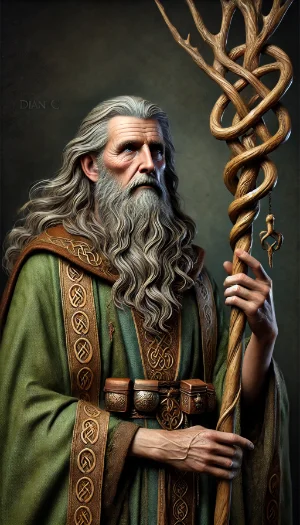In Irish mythology, the gods of the Tuatha Dé Danann stand tall among the ancient tales. While warriors, kings, and druids often steal the limelight, there is one divine figure whose power was not in weapons or warfare, but in healing. His name was Dian Cécht, the god of medicine and healing, and his story is both fascinating and tragic.
Who Was Dian Cécht?

Dian Cécht (pronounced DEE-an ket) was the chief physician of the Tuatha Dé Danann, the supernatural race of gods who arrived in Ireland long before the Milesians. His name is thought to mean “swift power” or “divine healer”, and he played a key role in some of the most important events in early Irish legend.
His skills in healing were unmatched, and he could cure the wounded, restore the sick, and even craft limbs for the maimed. But his story is not just one of miraculous healing—it is also one of pride, jealousy, and the loss of ancient knowledge.
The Family of Dian Cécht
Dian Cécht belonged to a divine lineage of healers and warriors. Among his children were:
- Miach – A gifted healer who surpassed his father’s talents. Miach managed to heal King Nuadu completely, restoring his flesh arm after his father had replaced it with a silver one. This act led to Dian Cécht killing his own son out of envy.
- Airmed – Airmed was a skilled healer and herbalist. After Miach’s death, she discovered that 365 healing herbs had grown from his grave—one for every part of the human body. She began to catalogue them, but Dian Cécht, again driven by jealousy, scattered the herbs, causing humanity to lose the complete knowledge of healing forever.
- Cian – In some versions of the myth, Cian is described as Dian Cécht’s son. Cian went on to father Lugh, the great warrior and master of many arts, making Dian Cécht Lugh’s grandfather.
Dian Cécht’s Great Deeds
The Silver Hand of Nuadu
One of Dian Cécht’s most famous feats was the crafting of a silver arm for King Nuadu, who had lost his arm in battle. In Irish society, a king had to be physically whole to rule. Thanks to Dian Cécht’s work, Nuadu became known as Nuadu Airgetlám (“Nuadu of the Silver Hand”) and was able to reclaim his kingship.
Later, Miach restored Nuadu’s real arm, which further exposed his superior skill—and sealed his tragic fate.
The Healing Well of Sláine
During the Second Battle of Mag Tuired, a war between the Tuatha Dé Danann and the monstrous Fomorians, Dian Cécht worked tirelessly to heal the wounded. Alongside Airmed and other healers, he prepared a magical healing well, sometimes called Tobar Sláine. Warriors who were injured were placed into the well, and they emerged fully restored and ready to fight again. This well gave the Tuatha Dé Danann a vital advantage during the war.
The Loss of Perfect Healing
Perhaps the most tragic moment in Dian Cécht’s story is not his victories, but what was lost through his pride. After killing his son Miach, the herbs that grew from Miach’s grave had the power to cure every illness and injury. But when Airmed began to record their properties, Dian Cécht scattered them in a jealous rage.
It is said that this act is why no one today knows all the cures for every human ailment. The knowledge was lost, and only fragments of it remained.
Legacy of Dian Cécht
Dian Cécht stands out in Irish mythology as a symbol of divine healing and the power of medicine, but also as a warning about pride. He represents a world where gods could make miracles happen—but could also destroy them out of envy.
He is sometimes compared to other healer gods from Indo-European traditions, such as Asclepius of Greek mythology. His name appears in some early Irish texts related to medicine, showing that his legend had a long-lasting influence on the island’s storytelling and healing traditions.
Final Thoughts
Dian Cécht is a powerful figure whose story touches on the importance of healing, the tragedy of lost knowledge, and the deep flaws even gods can carry. Through him, we see the beauty of divine gifts—and the dangers of letting jealousy and pride undo them.
Whether you’re new to Irish mythology or a long-time lover of the tales of the Tuatha Dé Danann, the story of Dian Cécht is one well worth remembering. His role as one of the Gods in Irish Mythology is packed full of intrigue and shows the issues of wanting too much power and prestige.
For information on the Tuatha Dé Danann the UCC Celt studies has a fantasic wealth of knowledge. Vist their CELT website for more information.
